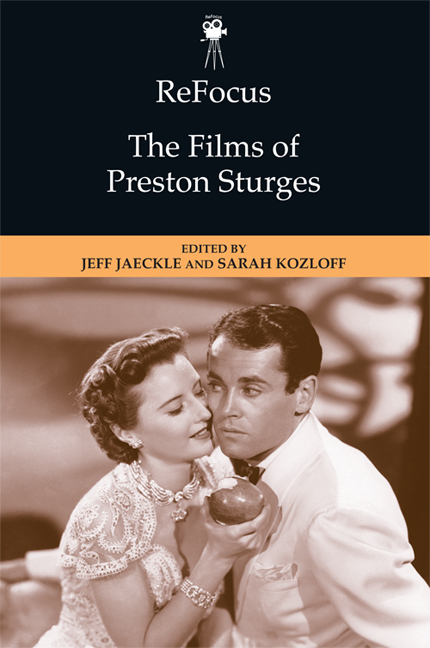Book contents
Introduction: An Agile Mind—The Many Stands of Preston Sturges
Published online by Cambridge University Press: 05 September 2016
Summary
Preston Sturges has long been a study in contrast, inspiring highly divergent characterizations such as genius and fluke, artist and entertainer, auteur and sellout. These extremes seem warranted when considering his startlingly eclectic life. A groundbreaking writer-director, Sturges was also a songwriter, inventor, restaurateur, and engineer. He created some of the most witty, acerbic, and hilarious comedies of the 1940s, yet his forays into dramatic genres resulted in several dull and saccharine on-screen moments. He was considered the most “American” of Hollywood filmmakers, yet he lived in Europe between the ages of eight and fifteen, and spent the final years of his life in France. He was devoted to his globetrotting socialite mother, Mary Desti, yet he had an abiding love and respect for his pragmatic, stockbroker stepfather, Solomon Sturges. He was one of the highest-paid people in the USA in the mid-1940s, yet he was consumed by debt and failure upon his death in 1959.
Antinomies like “auteur” and “sellout” are therefore useful for making sense of Sturges; however, they also cast him as an ambivalent character in his own story. This in turn has a narrowing effect, as all of the events and details of his life are reduced to two extremes. Perhaps most famous are James Agee's movie reviews for The Nation, in which he plays up Sturges's ambivalent personality and finds, not surprisingly, that he suffers from a neurosis. Agee contrasts Sturges's “retching, permanently incurable loathing for everything that stank of ‘culture,’ of ‘art’” with his “desperate respect and hunger for success”; he argues that these twin drives resulted in films that are “paradoxical marvels of self-perpetuation and self-destruction.” Although these characterizations smack of pseudo-psychoanalysis, Agee was not alone in spinning such narratives. Andrew Sarris would rehearse (and tacitly endorse) this view in 1968 when referring to Sturges's ambivalence, which derived from “the incongruity of continental sophistication being challenged by American pragmatism.” Richard Corliss would rehash a similar argument in Talking Pictures when referring to the “schizophrenic showdown between two sides of the writer-director.”
These critical constructs, as G. Tom Poe's chapter reminds us, often tell us as much about the critics as they do about the object of study.
- Type
- Chapter
- Information
- ReFocus: The Films of Preston Sturges , pp. 1 - 22Publisher: Edinburgh University PressPrint publication year: 2015



